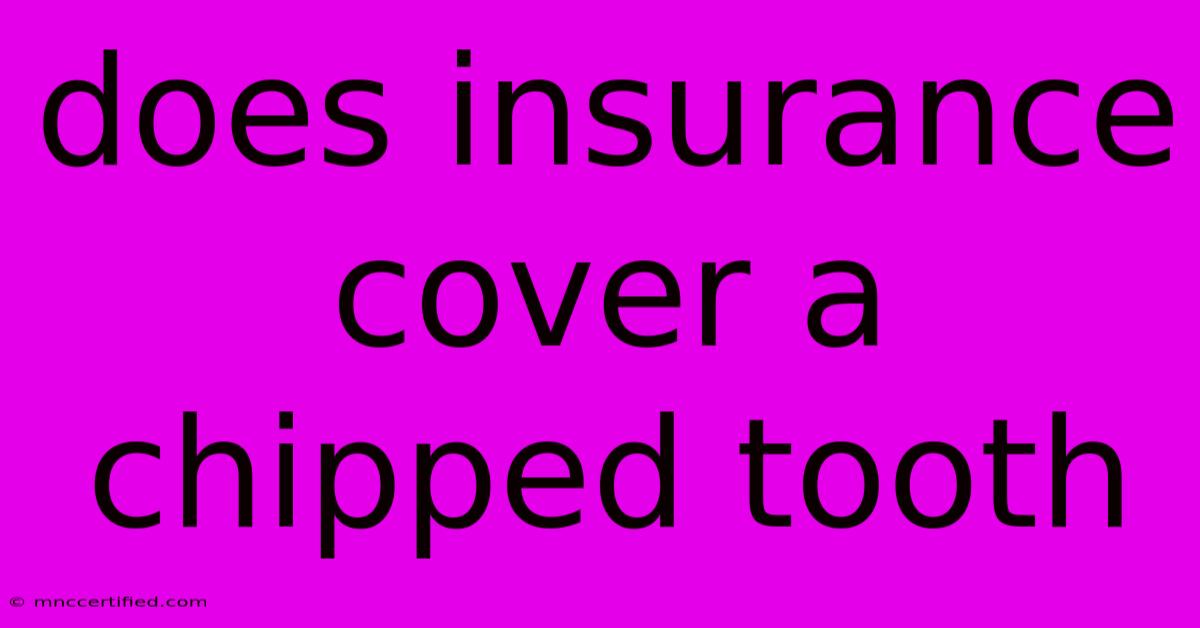Does Insurance Cover A Chipped Tooth

Table of Contents
Does Insurance Cover a Chipped Tooth? A Comprehensive Guide
A chipped tooth can be a painful and embarrassing experience. You might wonder if your dental insurance will cover the cost of repair. The answer is: it depends.
While dental insurance can often help cover the cost of fixing a chipped tooth, it's not always a guarantee. Here's a breakdown of what factors influence coverage and what you can expect:
What Determines Coverage for a Chipped Tooth?
Several factors come into play when deciding if your insurance covers a chipped tooth:
- Type of Coverage: The most crucial factor is the type of dental insurance plan you have.
- Basic plans typically offer limited coverage, often only covering essential procedures like extractions and fillings.
- Comprehensive plans are more likely to cover restorative procedures like crowns, veneers, and bonding, which are often used to fix chipped teeth.
- Cause of the Chip: Insurance companies may consider the cause of the chip.
- Accidental injuries are generally more likely to be covered.
- Damage caused by wear and tear, such as grinding your teeth, might not be covered.
- Pre-existing Conditions: If you have a pre-existing dental condition that contributed to the chip, your insurance company might consider it a pre-existing condition and limit or deny coverage.
- Deductible and Co-pay: Remember your deductible and co-pay requirements. Even if your plan covers the procedure, you'll likely have to pay a portion of the costs.
- Specific Policy Exclusions: Review your policy document carefully for any specific exclusions or limitations related to chipped teeth or restorative dentistry.
What Happens If Your Insurance Doesn't Cover It?
Don't worry if your insurance doesn't cover the entire cost. There are still options:
- Negotiate with Your Dentist: Sometimes dentists are willing to work with patients who have limited insurance coverage. You can discuss payment plans or discounts.
- Dental Savings Plans: Consider joining a dental savings plan. These plans offer discounted rates on dental services, including chipped tooth repairs.
- Alternative Treatments: Depending on the severity of the chip, there might be less expensive alternative treatments like bonding or temporary fillings.
Tips to Prevent Chipped Teeth
Here are some preventive measures you can take to minimize your risk of a chipped tooth:
- Wear a Mouthguard: Use a mouthguard during sports or activities that increase the risk of injury to your teeth.
- Avoid Hard Foods: Be cautious when eating hard foods like nuts, ice, or hard candies.
- Brush and Floss Regularly: Proper oral hygiene can help prevent cavities and gum disease, which can weaken teeth and make them more susceptible to chipping.
- See Your Dentist Regularly: Regular check-ups allow your dentist to detect and address any potential problems before they worsen.
Conclusion
While dental insurance can provide valuable financial assistance for chipped tooth repair, it's crucial to understand your coverage and the factors that might influence it. By being aware of your policy details and exploring alternative options, you can navigate the costs and get the necessary treatment for a healthy and beautiful smile.

Thank you for visiting our website wich cover about Does Insurance Cover A Chipped Tooth. We hope the information provided has been useful to you. Feel free to contact us if you have any questions or need further assistance. See you next time and dont miss to bookmark.
Featured Posts
-
Wales Defeats Fiji Muntzs Key Performance
Nov 11, 2024
-
Hilary Mantels The Mirror And The Light Review
Nov 11, 2024
-
France Holiday Hours November 11th Open Closed
Nov 11, 2024
-
Old Taylor Bond Street Shaving Cream
Nov 11, 2024
-
Celtics Win Tatum Explodes For 23 In Second Half
Nov 11, 2024